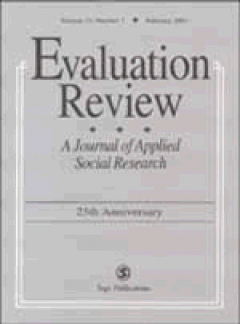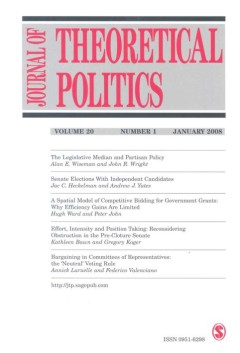Filter by

Use of Web and In-Person Survey Modes to Gather Data From Young Adults on Sex…
In a randomized test of mixed-mode data collection strategies, 386 participants in the Raising Healthy Children (RHC) Project were either (a) asked to complete a survey via the Internet and later offered the opportunity to complete the survey in person or (b) first offered an in-person survey, with the Web follow-up. The Web-first condition resulted in cost savings although the overall completi…
- Edition
- Volume 33, Number 2, April 2009. pp. 138-158
- ISBN/ISSN
- 0193-841x
- Collation
- -
- Series Title
- Evaluation Review
- Call Number
- -

A Statistical Perspective on the Design of Drug-Court Studies
Recent meta-analyses of drug-court studies recognized the poor methodological quality of the evaluations, with only a few being randomized. This article critiques the design of the randomized studies from a statistical perspective. Learning points are identified for future drug-court studies and are applicable to evaluations both of other specialist courts and of court-based interventions more …
- Edition
- Vol. 33, No. 3, June 2009. pp. 257-280
- ISBN/ISSN
- 0193841x
- Collation
- -
- Series Title
- Evaluation Review
- Call Number
- -

Institutional Design and Utilization of Evaluation: A Contribution to a Theor…
Growing interest in the institutionalization of evaluation in the public administration raises the question as to which institutional arrangement offers optimal conditions for the utilization of evaluations. Institutional arrangement denotes the formal organization of processes and competencies, together with procedural rules, that are applicable independently of individual evaluation projects.…
- Edition
- Vol. 33, No. 3, June 2009. pp. 226-256
- ISBN/ISSN
- 0193841x
- Collation
- -
- Series Title
- Evaluation Review
- Call Number
- -

Predicting Drug Use at Electronic Music Dance Events: Self-Reports and Biolog…
Most information on the prevalence of drug use comes from self-report surveys. The sensitivity of such information is cause for concern about the accuracy of self-report measures. In this study, self-reported drug use in the last 48 hr is compared to results from biological assays of saliva samples from 371 young adults entering clubs. The relationship between self-reports and drug presence in …
- Edition
- Vol. 33, No. 3, June 2009.pp. 211-225
- ISBN/ISSN
- 0193-841x
- Collation
- -
- Series Title
- Evaluation Review
- Call Number
- -

Old Wine in New Skins: The Sensitivity of Established Findings to New Methods
Findings from an evaluation of a model system for delivering mental health services to youth were reassessed to determine the robustness of key findings to the use of methodologies unavailable to the original analysts. These analyses address a key concern about earlier findings�that the quasi-experimental design involved the comparison of two noncomparable groups. The authors employed propensit…
- Edition
- Vol. 33, No. 3, June 2009. pp. 281-306
- ISBN/ISSN
- 0193-841x
- Collation
- -
- Series Title
- Evaluation Review
- Call Number
- -

Design and Analysis of the Community Youth Development Study Longitudinal Coh…
Communities That Care (CTC) is a prevention system designed to reduce adolescent substance use and delinquency through the selection of effective preventive interventions tailored to a community's specific profile of risk and protection. A community-randomized trial of CTC, the Community Youth Development Study, is currently being conducted in 24 communities across the United States. This artic…
- Edition
- Vol. 33, No. 4, August 2009.pp. 311-334
- ISBN/ISSN
- 0193841x
- Collation
- -
- Series Title
- Evaluation Review
- Call Number
- -

Incorporating Cost in Power Analysis for Three-Level Cluster-Randomized Designs
In experimental designs with nested structures, entire groups (such as schools) are often assigned to treatment conditions. Key aspects of the design in these cluster-randomized experiments involve knowledge of the intraclass correlation structure, the effect size, and the sample sizes necessary to achieve adequate power to detect the treatment effect. However, the units at each level of the hi…
- Edition
- Vol. 33, No. 4, August 2009. pp. 335-357
- ISBN/ISSN
- 0193841x
- Collation
- -
- Series Title
- Evaluation Review
- Call Number
- -

The Impact of Active Consent Procedures on Nonresponse and Nonresponse Error …
This article reports results from a student survey fielded using an experimental design with 14 Kentucky school districts. Seven of the 14 districts were randomly assigned to implement the survey with active consent procedures; the other seven districts implemented the survey with passive consent procedures. We used our experimental design to investigate the impact of consent procedures on (a) …
- Edition
- Vol. 33, No. 4, August 2009. pp. 370-395
- ISBN/ISSN
- 0193-841x
- Collation
- -
- Series Title
- Evaluation Review
- Call Number
- -

Review and Analysis of Laws Related to Strangulation in 50 States
Nonlethal strangulation of intimate partners has substantial direct health effects and is associated with an increased risk of later lethal violence by a partner or ex-intimate partner but can be difficult to prosecute under felony assault statutes. After review of state laws regarding assault, the authors identified 10 states with specific legislation related to strangulation as of March 2009 …
- Edition
- Vol. 33, No. 4, August 2009.pp. 358-369
- ISBN/ISSN
- 0193-841x
- Collation
- -
- Series Title
- Evaluation Review
- Call Number
- -

The Social Construction of ``Evidence-Based'' Drug Prevention Programs: A Rea…
This study explores the possibility that any drug prevention program might be considered ``evidence-based'' given the use of data analysis procedures that optimize the chance of producing statistically significant results by reanalyzing data from a Drug Abuse Resistance Education (DARE) program evaluation. The analysis produced a number of statistically significant differences between the DARE …
- Edition
- Vol. 33, No. 4, August 2009.pp. 396-414
- ISBN/ISSN
- 0193-841x
- Collation
- -
- Series Title
- Evaluation Review
- Call Number
- -

A Comparison of Web-Based and Paper-Based Survey Methods: Testing Assumptions…
Web-based surveys have become more prevalent in areas such as evaluation, research, and marketing research to name a few. The proliferation of these online surveys raises the question, how do response rates compare with traditional surveys and at what cost? This research explored response rates and costs for Web-based surveys, paper surveys, and mixed-mode surveys. The participants included eva…
- Edition
- Volume 33, Number 5, October 2009.pp. 464-480
- ISBN/ISSN
- 0193841x
- Collation
- -
- Series Title
- Evaluation Review
- Call Number
- -

Evaluating Monitoring Systems in the European Social Fund Context: A Sociotec…
In contrast to the prevailing image of monitoring systems as technical systems, it is proposed that they should rather be conceived of as social endeavors at exchanging information. Drawing on the monitoring and evaluation framework of Cornford, Doukidis, and Forster, the concept of information agreement is suggested as a way of assessing the quality of monitoring systems in context. Preliminar…
- Edition
- Volume 33, Number 5, October 2009.pp. 419-445
- ISBN/ISSN
- 0193-841x
- Collation
- -
- Series Title
- Evaluation Review
- Call Number
- -

Active Consent in Urban Elementary Schools: An Examination of Demographic Dif…
The consent process is an integral piece of research and evaluation studies, especially when conducted within a school setting. The challenge of reaching parents of students to obtain consent is an issue with which those conducting school-based studies grapple. The literature suggests that the success of the consent process can affect the representativeness of the sample. This study describes o…
- Edition
- Volume 33, Number 5, October 2009.pp. 481-496
- ISBN/ISSN
- 0193-841x
- Collation
- -
- Series Title
- Evaluation Review
- Call Number
- -

Evaluating Retailer Behavior in Preventing Youth Access to Harmful Legal Prod…
This article reports results from a feasibility study of a community effort to reduce the availability of legal products that youth can use to get high. The study evaluated the potential of youth purchase attempts to detect actual changes in retail availability of harmful legal products. These results were triangulated with self-reports from retailers about their own policies and practices. Bef…
- Edition
- Volume 33, Number 5, October 2009.pp. 497-515
- ISBN/ISSN
- 0193-841x
- Collation
- -
- Series Title
- Evaluation Review
- Call Number
- -

The Influence of ‘‘No Child Left Behind’’ Legislation on Drug Prevent…
This study examines prevention practices and perceptions in U.S. schools since passage of federal No Child Left Behind (NCLB) legislation, using survey data from state education agencies (SEA) and a population-based sample of school districts. Only one third of U.S. public school districts rely on evidence-based prevention curriculum in middle schools. Funding from other sources and large size …
- Edition
- Volume 33, Number 5, October 2009.pp. 446-463
- ISBN/ISSN
- 0193-841x
- Collation
- -
- Series Title
- Evaluation Review
- Call Number
- -

An Approach for Addressing the Multiple Testing Problem in Social Policy Impa…
In social policy evaluations, the multiple testing problem occurs due to the many hypothesis tests that are typically conducted across multiple outcomes and subgroups, which can lead to spurious impact findings. This article discusses a framework for addressing this problem that balances Types I and II errors. The framework involves specifying confirmatory and exploratory analyses in study prot…
- Edition
- Vol. 33, No. 6, December 2009. pp. 519-538
- ISBN/ISSN
- 0193841x
- Collation
- -
- Series Title
- Evaluation Review
- Call Number
- -

Development of a Medicaid Behavioral Health Case-Mix Model
Many Medicaid programs have either fully or partially carved out mental health services. The evaluation of carve-out plans requires a case-mix model that accounts for differing health status across Medicaid managed care plans. This article develops a diagnosis-based case-mix adjustment system specific to Medicaid behavioral health care. Several different model specifications are compared that u…
- Edition
- Vol. 33, No. 6, December 2009. pp. 539-567
- ISBN/ISSN
- 0193841x
- Collation
- -
- Series Title
- Evaluation Review
- Call Number
- -

Evaluation of the CSEC Community Intervention Project (CCIP) in Five U.S. Cities
In response to the commercial sexual exploitation of children (CSEC) within five U.S. cities, the CSEC Community Intervention Project (CCIP) was created to enhance collaboration among nongovernmental organization (NGO) representatives, law enforcement officials and prosecutors in Chicago, Atlantic City, Denver, Washington, D.C., and San Diego. A total of 211 participants were surveyed during a …
- Edition
- Vol. 33, No. 6, December 2009. pp. 568-595
- ISBN/ISSN
- 0193841x
- Collation
- -
- Series Title
- Evaluation Review
- Call Number
- -

A Spatial Model of Competitive Bidding for Government Grants: Why Efficiency …
With a view to improving public sector efficiency many governments now make public sector bodies competitively bid for funding. We model the bidding process as a game of spatial competition. Using Monte Carlo simulations we show that in efficient equilibria many bidding groups will not be under competitive pressure. The model suggests that this is because their ideal projects are inherently v…
- Edition
- Vol. 20, No. 1, January 2008. Page 47-66
- ISBN/ISSN
- 09516298
- Collation
- -
- Series Title
- Journal of Theoritical Politics
- Call Number
- -

Effort, intensity and position taking: reconsidering obstruction in the pre-c…
Effort is a crucial element of the legislative process — writing bills, forming coalitions, crafting strategies, and debating. We develop a model in which legislative decisions are the product of competitive effort by two teams, one trying to pass new legislation, and the other to block it. Teams choose effort levels based on preferences over the policy outcome, political rewards for ef…
- Edition
- Vol. 20, No. 1, January 2008. Page 67-92
- ISBN/ISSN
- 0951-6298
- Collation
- -
- Series Title
- Journal of Theoretical Politics
- Call Number
- -
 Computer Science, Information & General Works
Computer Science, Information & General Works  Philosophy & Psychology
Philosophy & Psychology  Religion
Religion  Social Sciences
Social Sciences  Language
Language  Pure Science
Pure Science  Applied Sciences
Applied Sciences  Art & Recreation
Art & Recreation  Literature
Literature  History & Geography
History & Geography